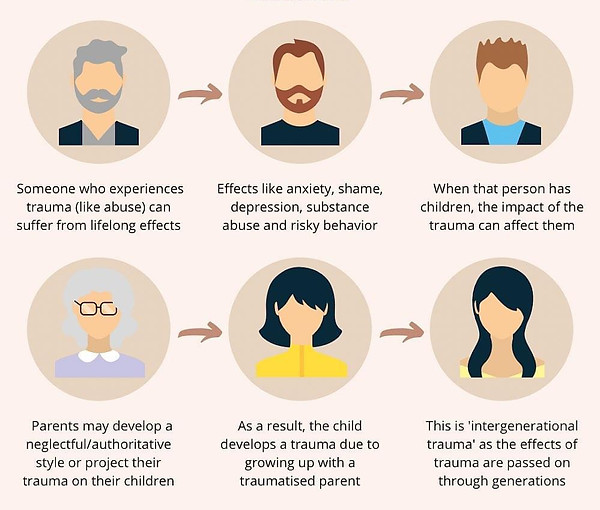Intergeneration Trauma




Simple trauma describes a single, circumscribed traumatic event (such as an assault). Complex trauma occurs when a person experiences a series of repeated traumatic events or when new, unique traumatic incidents occur. Complex trauma early in life can damage multiple aspects of the child’s development. Complex trauma may involve entire families in incidents of violence, addiction, or poverty. (1)
Historical Trauma
Historical trauma refers to traumatic experiences or events that are shared by a group of people within a society, or even by an entire community, ethnic, or national group. Historical trauma meets three criteria: widespread effects, collective suffering, and malicious intent (2). Historical Trauma Response (HTR) can manifest as substance abuse, suicidal thoughts, depression, anxiety, low self-esteem, anger, violence, and difficulty in emotional regulation (3)
Intergenerational Trauma
Intergenerational trauma (sometimes referred to as trans- or multigenerational trauma) is defined as trauma that gets passed down from those who directly experience an incident to subsequent generations. Intergenerational trauma may begin with a traumatic event affecting an individual, traumatic events affecting multiple family members, or collective trauma affecting larger community, cultural, racial, ethnic, or other groups/populations (historical trauma).
Effects on Children
Children experience and understand the world primarily through direct caregivers and are, therefore, profoundly affected by their parents’ modeling. Children both mimic their parents’ behaviors and learn to navigate future relationships based on how they learned to relate to their parents. Enduring coping mechanisms may be forged out of efforts to avoid and/or “fix” a parent’s abusive behavior, anger, depression, neglect, or other problematic behaviors.
